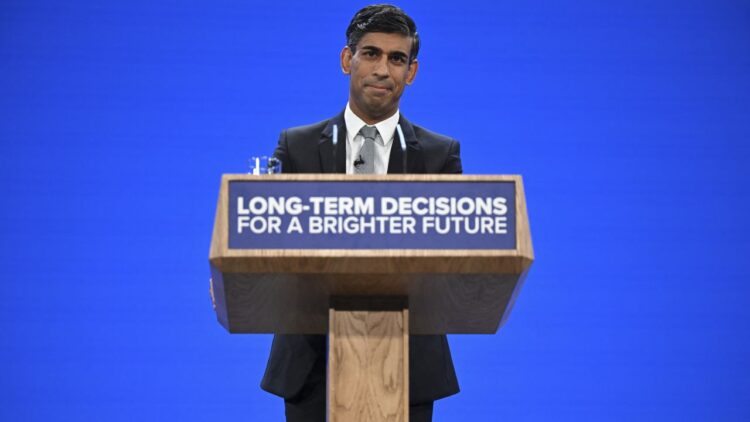By Gabriel Princewill-
Rishi Sunak today announced controversial plans to overhaul the nation’s education system. The centerpiece of this transformation is the scrapping of A Levels and T Levels in favor of a new qualification called the “Advanced British Standard.”
This unprecedented move aims to revolutionize the way British students approach post-16 education, introducing comprehensive changes that could have far-reaching implications for generations to come.
The proposals would increase the number of classroom hours by 15% for most sixth-formers, adding about an hour a day, while requiring students to study “some form of English and maths” until the age of 18.
Rather than three A-levels or a single T-level course, students would be able to study five subjects, including “major” and “minor” subjects from both technical and academic options.
Rishi Sunak’s radical announcement has set the stage for a profound transformation of the UK’s education system, but whether the plan turns out to be beneficial or detrimental to the interests of young pupils remains a value judgement.
Departure
The proposed “Advanced British Standard” represents a departure from traditional educational models, offering students a more comprehensive and holistic approach to learning.
The introduction of compulsory English and math education until the age of 18 aims to bolster essential skills, while the pursuit of “parity of esteem” seeks to address long-standing disparities in the perception of academic and technical education.
The “Advanced British Standard” is poised to bring A Levels and T Levels under one umbrella, offering students a unique blend of academic and technical education.
At the heart of this change is the expansion of subjects available to students beyond the age of 16, coupled with compulsory English and math education until the age of 18.
Sunak drew parallels with the International Baccalaureate (IB) program, which has already found a place in some UK schools.
The announcement has ignited a wave of anticipation and apprehension, with its potential to redefine the educational landscape of Britain. A central element of this transformation is the pursuit of “parity of esteem” between academic and technical education—a bold aspiration that has long been a subject of debate in the country.
A Historical Perspective on A Levels
A Levels have been a cornerstone of the British education system since their inception in 1951.
These examinations have played a pivotal role in assessing the knowledge and abilities of post-16 students for more than seven decades.
Over the years, they have undergone various revisions and adaptations to meet the evolving needs of students and society.
However, the fundamental structure and purpose of A Levels remained largely intact: to provide a standard for measuring academic excellence and readiness for higher education.
A Levels have traditionally focused on academic subjects, encouraging students to specialize in their chosen fields.
The curriculum typically consists of three or four subjects, enabling students to explore their academic interests deeply.
The qualifications are widely recognized and accepted by universities both in the UK and abroad.
On the other hand, T Levels, introduced in 2020, aimed to bridge the gap between academic and vocational education.
These technical qualifications were designed to equip students with the practical skills and knowledge necessary to excel in specific industries. T Levels offered a different pathway for students who aspired to enter the workforce directly or pursue higher-level technical education.
The Birth of the “Advanced British Standard”
Rishi Sunak’s announcement introduces a seismic shift in the educational landscape. The proposed “Advanced British Standard” seeks to combine the best of both worlds, offering a comprehensive education that blends academic rigor with practical expertise.
This revolutionary approach could redefine how students and educators perceive post-16 education.
Advocates of this change argue that it empowers students with a more well-rounded education and allows them to explore diverse interests, potentially fostering a deeper understanding of various disciplines.
However, critics worry that a broader curriculum could overwhelm students with an already heavy workload. Balancing multiple subjects may lead to increased stress and a diluted focus on specialized areas of interest.
Additionally, it remains to be seen how schools will adapt to accommodate the additional subjects and the potential strain on resources.
The Quest for “Parity of Esteem”
Central to Rishi Sunak’s vision for the “Advanced British Standard” is the quest for “parity of esteem” between academic and technical education. This has long been a contentious issue in the UK, with critics arguing that academic qualifications such as A Levels were often favored and held in higher regard than vocational alternatives like T Levels.
Achieving “parity of esteem” is a complex challenge that extends beyond educational reform.
It involves reshaping societal attitudes, challenging stereotypes, and ensuring that students are empowered to choose the educational pathways that best align with their interests and career aspirations. While the concept is admirable, its practical implementation remains a formidable task.
Sunak’s proposal to merge A Levels and T Levels into a single qualification aims to bridge the gap between these two educational streams.
As with any significant educational reform, the announcement has elicited a wide range of reactions.
Anticipation is running high among those who see the potential for a more flexible, comprehensive education system that better prepares students for the challenges of the future.
The prospect of fostering a generation of well-rounded individuals with strong foundational skills is a compelling vision.
Conversely, apprehension abounds among those who worry about the practical implications and potential pitfalls of such an ambitious transformation.
Concerns include the feasibility of implementing a broader curriculum, the impact on students’ well-being, and the resources required to support these changes adequately.




